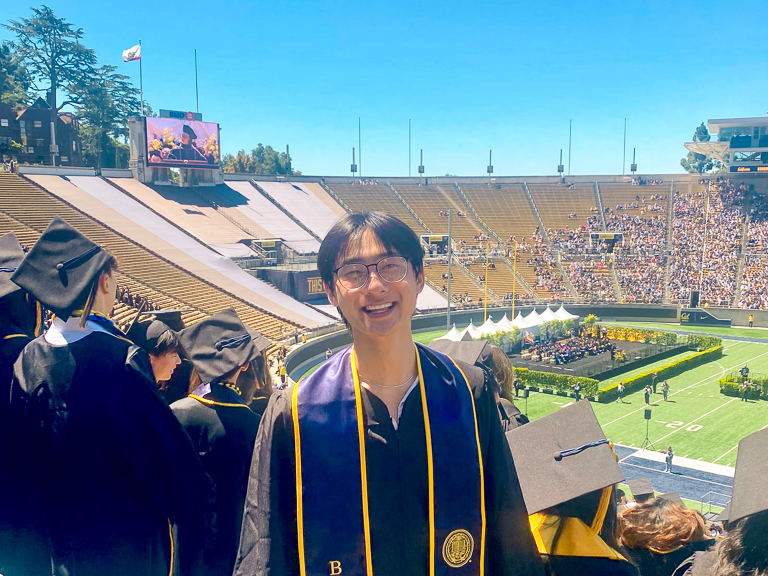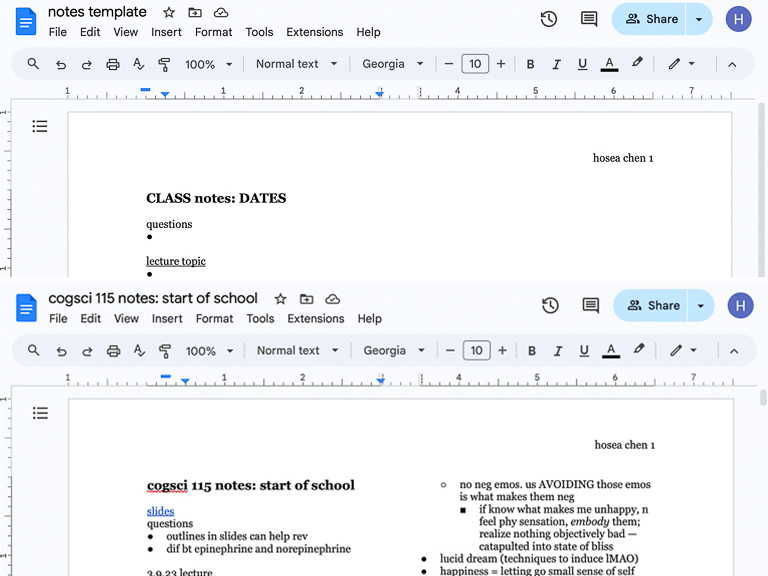
Balance Your Academic, Social, & Personal Life at UC Berkeley
There is a meme that as a college student, you can only have two of these three things: good grades, a social life, and enough sleep. Well… How did they know?
During my first and second years at Berkeley, I prioritized social and academic life; I don’t regret it but I could have used more sleep and a better immune system (there was a semester I got sick 3 times). Moving into my third and fourth years, I felt like I was happily balancing social, academic, and personal life (i.e., well-being), more times than not.
That balance was the result of trial and error, taking others’ advice, and what I learned academically. Here are the tips and habits that I relied on throughout my college years to navigate those key areas of life.
Academic Life
For context, I majored in cognitive science and minored in creative writing and data science.
Take notes in class: Here’s how I did it. I created a notes template Google document that I would make a copy of and use for each class, during each assessment period. For example, in my first lecture of COGSCI 115, I made a copy of the template document, renamed it “cogsci 115 notes: start of school,” and I used it for all my lecture and discussion notes until the first assessment about that material.
The notes template has the following structure: double column format (to save space and for easier scanning), adjusted default spacing of bullet points (to optimize the column space), page numbers (nice when the document gets long), and adjusted font styles. I have resources and assessment-relevant questions at the beginning of the document—I later transitioned to highlighting in light red parts of my notes that I was confused about—and then sections for each lecture/discussion.

Sample view of Hosea’s notes template and notes for COGSCI 115.
I prefer digital over handwritten notes because while I acknowledge hand-writing notes is better for retaining information, it is valuable for me to keep up with the class pace through typing. My notes on Google Drive are also easily accessible and searchable—it is inevitable that I will forget some material, so being able to reference the information quickly is a big digital perk. To review the material, I still get to manually interact with it by annotating the document digitally or after printing it out.
Make syllabus notes: Every semester, I kept a Google document for notes on all my classes’ syllabi, with links to them. This is a really nice shortcut throughout the semester if I have to find when a professor’s office hours are or what my GSI’s email is.
Attend lectures and discussions: In my experience, attending lectures and discussions is the most important for doing well in a class (although this might differ for classes in the computer science department, for example). Not only can you learn, feel involved, and stay updated about what’s going on, the instructor talks about what they find the most important (and thus what is most likely going to be on assessments). In fact, while readings are important, I was able to do well in my classes just from lecture material. For research papers, I’d read the abstract, introduction (if unfamiliar with the topic), figures, conclusion, and more if needed.
Study smart: Review for assessments that are more problem-set based (like math and physics) with practice exams. Otherwise, I found it sufficient to review my class notes by annotating and clarifying previously marked questions. Many classes (especially psychology ones) have class Discords started by students that serve as collaboration hubs, especially for collaborative exam study guides.
Build connections and study groups: Having study groups or simply people you know in a class is super helpful, especially when you have questions about the material or can’t make class one day. A lot of the time, you can find friends from extracurriculars or other classes taking the same class as you. Otherwise, people are usually friendly and eager to form study groups (especially during discussions). As for office hours, I went to them when I was interested in a professor or the content. People notice when you actively engage in classes you care about—this is great for developing relationships with them.
Social Life
Over the years, I’ve experienced and heard from others that being socially involved is very predictive of feeling good about the semester.
Balance your schedule: For me, I’ve found that the optimal level of engagement each semester is ~16 class units, 1 social club, and 1 professional development club. My classes and clubs kept me active and growing in the campus community, and I still had discretionary time for spontaneous hangouts, self-care, and whatnot.
Plan ahead: When going out with friends (iykwim), I load up on carbs before and then when I get home I drink LOTS of water before going to sleep. These 2 actions were actually life hacks for me.
Stretch your comfort zone: I also learned to reflect on whether I truly wanted to be social or alone. When I was social because of FOMO or just because I was invited, I was often too numb/tired to enjoy being around others, and I found it more rejuvenating to be alone. However, when I wanted to be social, those interactions were so uplifting and just what I needed. Whenever I wanted to do something but was scared to try it (like attending a social event where I didn’t really know the people), I was almost always glad that I did.
Personal Life
Get quality sleep: In terms of personal well-being, I find consistent and good-quality sleep to be foundational. To get that, I have a night and morning routine that I enjoy so I can sleep and wake up ready and on time. For example, I stop working at 11 p.m., prepare for bed for 30 minutes, and have downtime until I sleep at 1 a.m.
Experience emotions: In terms of emotional well-being, it is a really big topic (I even took a class on it and would highly recommend—PSYCH 156). For example, I never really knew how to deal with negative emotions growing up, and a big thing I learned is to experience them like the weather: Emotions come and go, so I can feel them and let them pass through. I learned there is so much wisdom to emotions so it’s quite a privilege to hear them (especially if they are recurring) and then decide what to do.

View of Berkeley from top of Fire Trail. Clouds moving across the sky is one way I visualize emotions.
Manage rumination: If I was stuck ruminating about certain thoughts throughout the day, I found it effective to schedule in rumination time (~15 minutes) so I can dismiss the thoughts with “I’ll have time to think about it later.” During rumination time, I sit down, lean into, and experience those thoughts and feelings. There are other strategies out there (reappraisal, engaging in another absorbing activity, social support…), but this was the most effective for me as it maximizes my time being productive and feeling better.
Check in weekly: To tie everything together, I have a habit of doing weekly check-ins with myself. In each, I plan for the week ahead and reflect on the past week through journaling. For the week ahead, I plan things like a growth goal, 3 physical activities, and 3 social plans—this is systematic but I find it useful as it keeps me consistent in my well-being. To reflect on the past week, I journal about things like what I’m grateful for, how I am doing, and what I want to be doing. These check-in items are the result of my experiences and my classes in positive psychology, and they help with well-being, personal development, and productivity.
Best Wishes
You now have knowledge I’ve gained over four years! These are things that I would have wanted to know—especially back in freshman year—so hopefully you gained an edge in finding your own balance within life at Cal.
Hosea Chen, UC Berkeley Class of 2024, majored in cognitive science and minored in creative writing and data science.
Want More?
- Learn about how Hosea chose classes and studied for them.
- Having trouble managing a busy schedule? Here’s Hosea’s take.
- Get inspired in ways to be happy at Cal.
- Learn more safety tips from the PartySafe Toolkit.